It is irresistible, it knows how to seduce millions of men, women and children around the world. It adapts its tastes depending on its fans and it has passed the years without a single failure of fashion. Above all, it knows exactly how to bring pleasure to all. Jealously kept in a cupboard for a guilty pleasure or shared with friends, it is the best lover that has ever existed.
It isn’t a bird. It isn’t a plane. It isn’t even Superman, and yet it is the one thing that has superpowers which no one can deny! Well, let call it ‘Chocolate’!
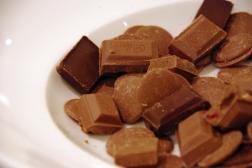
The love affair between man and the cocoa bean started over 3000 years ago with the Mayan and the Aztec who couldn’t resist its charms. Associated with fertility and believed to fight fatigue, the earliest use of chocolate was as an alcoholic beverage and then consumed in a bitter, spicy drink called xocolātl, often seasoned with vanilla, chilli pepper, and achiote.
In 1687, Hans Sloane, after whom Sloane Square in named, brought back in his luggage from Jamaica a recipe that millions of English children and adults will always thank him for: drinking chocolate. This comfort drink that everybody enjoys for breakfast or back from the slopes on a winter day was originally made of water and cocoa. Finding it much too strong for his taste, Hans Sloane mixed cocoa with milk instead. Admiring it for its medicinal attributes, apothecaries started stocking it before the Cadbury Brothers started selling Sloane’s drinking chocolate in tins in the IX century… and the rest, as they say, is history.
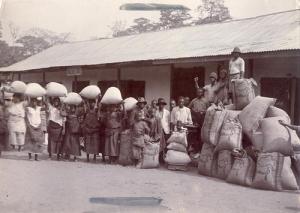
Their quest began 101 years ago when the Cadbury brothers moved their cocoa production to Ghana where the local famers where better treated. And the latest chapter of the story has just come to light: From Autumn 2009 Cadbury Dairy Milk will be Fairtrade certified when they will triple the sales of cocoa under Fairtrade terms for cocoa farmers in Ghana to 15,000 tons a year, opening up new opportunities for thousands of farmers.
Today, 20 percent of the world‘s cocoa is produced in Ghana, making the country the second-biggest producer of cocoa beans after the Ivory Coast. But who was the mysterious person who brought this divine ingredient to Ghana? Three main players claim to have introduced the cocoa beans: The Swiss Missionaries, the British and Tetteh Quarshie, who is credited to be the official exporter.
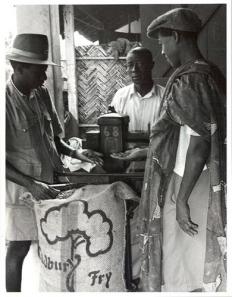
Born in 1842 in Accra, the capital of Ghana, Tetteh Quarshie took a trip to Fernando Po in his 20’s and returned six years later with cocoa beans. After a few fruitless attempts in Accra, he established a successful cocoa nursery in the Eastern region of Ghana and the cocoa industry was born.
The government further helped the economic development of Ghana and encouraged the growth of the cocoa industry by distributing cocoa beans to local farmers. Ghana now produces approximately 5,000 tons of Fairtrade cocoa, with an estimated 700,000 cocoa farmers producing Ghana’s second most valuable commodity after gold.
Why is it so important to get the certified Fairtrade?
One of the main objectives of Fairtrade is to increase farmer’s incomes by reducing the number of intermediaries between the farmers and the end consumer, earning farmers a larger share of the export price. Two other characteristics also add to this: a minimum price and an additional premium.
In the chocolate market, the minimum price per ton of cocoa is set by the Standards Unit at FLO at $1,600. The prices are set based on consultation with stakeholders and research into producers’ costs of sustainable production.
The additional premium is fixed at $150 per ton and is paid into a project development fund which invests in the building of schools, clinics, community centres, funding scholarships or paying medical bills. The decision of how the fund’s assets are spent falls upon a group of farmers, allowing them to take control of their business and community without having to rely on government and public estate’s decisions.
According to the Fairtrade association, this certification not only guarantees fair and stable prices, it also ensures an extra income to all those working in the industry. Additional benefits are the insurance of environmental protection, a stronger position in world markets and a closer link between consumers and producers.
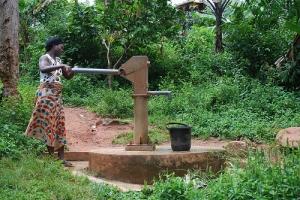
There is some controversy about the Fairtrade certification. A quick search on the web shows that a lot of people disagree with it, claiming that Fairtrade is a nice gimmick to sell products at higher prices and that farmers don’t benefit from it as much as they should. But like in any situation, there are always examples to show that some good ideas can create negative impact if they are used unwisely.
The movie ‘We feed the world’ shows how the globalization and search for money and power has had quite an absurd effect on the food industry. Erwin Wagenhofer, the director, travelled all around the world and brought back incredible stories like in Latin America where 350,000 hectares of agricultural land are dedicated to the cultivation of soybeans to feed Austria’s livestock while one quarter of the local population starves. In ‘Darwin’s Nightmare’, directed by Hubert Sauper, we are witness to the effects of the introduction of the Nile perch to Lake Victoria and how it has affected the ecosystem and economy of the region.
So yes, nobody is perfect and there will always be situations to prove that the perfect recipe doesn’t exist. It’s the exception which confirms the rule. Mixing an egg with some sugar is easy but to find the right balance to create the ultimate cake that everybody will crave for requires time and improvement.
So when the moment comes to snack on a chocolate bar, the most important thing is to enjoy this delicate moment of pleasure and the comforting feeling that the melted chocolate brings to our palates. And a few seconds later, it is always good to tell ourselves that this guilty pleasure is not a selfish one and it is shared by millions of Ghanaians doing their best to make the best cocoa beans.
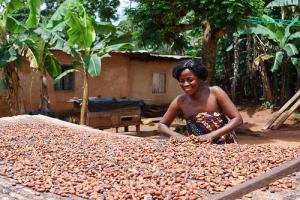
Posted in *JUST A THOUGHT Tagged: cadbury, chocolate, English, Fairtrade, Ghana
